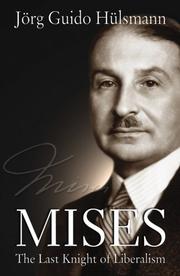| Listing 1 - 5 of 5 |
Sort by
|
Book
ISBN: 0932790011 9780932790019 Year: 1979 Publisher: San Francisco Cato Institute
Abstract | Keywords | Export | Availability | Bookmark
 Loading...
Loading...Choose an application
- Reference Manager
- EndNote
- RefWorks (Direct export to RefWorks)
Austrian school of economics --- Industrial policy --- Mixed economy --- economie mixte --- Economy, Mixed --- Third way (Economics) --- Capitalism --- Socialism --- Faraday partnerships --- Austrian school of economists --- Marginalist school of economics --- Schools of economics --- Marginal utility --- gemengde economie --- Great Britain --- Economic policy

ISBN: 9781933550183 Year: 2007 Publisher: Auburn Ludwig Von Mises-Institute
Abstract | Keywords | Export | Availability | Bookmark
 Loading...
Loading...Choose an application
- Reference Manager
- EndNote
- RefWorks (Direct export to RefWorks)
Mises, von, Ludwig E. --- Economists --- -Austrian school of economics --- 330.157 --- Austrian school of economists --- Marginalist school of economics --- Schools of economics --- Marginal utility --- Social scientists --- Von Mises, Ludwig --- Misaisi, --- Mises, Ludwig von, --- 米塞斯,
Book
ISBN: 8872190320 9788872190326 Year: 1997 Publisher: Torino,
Abstract | Keywords | Export | Availability | Bookmark
 Loading...
Loading...Choose an application
- Reference Manager
- EndNote
- RefWorks (Direct export to RefWorks)
Austrian school of economics. --- Liberalism. --- Social choice. --- Austrian school of economics --- Liberalism --- Social choice --- Choice, Social --- Collective choice --- Public choice --- Choice (Psychology) --- Social psychology --- Welfare economics --- Liberal egalitarianism --- Liberty --- Political science --- Social sciences --- Austrian school of economists --- Marginalist school of economics --- Schools of economics --- Marginal utility
Book
ISBN: 0300228228 9780300228229 0300249179 Year: 2019 Publisher: New Haven, CT : Yale University Press,
Abstract | Keywords | Export | Availability | Bookmark
 Loading...
Loading...Choose an application
- Reference Manager
- EndNote
- RefWorks (Direct export to RefWorks)
A group history of the Austrian School of Economics, from the coffeehouses of imperial Vienna to the modern-day Tea Party The Austrian School of Economics-a movement that has had a vast impact on economics, politics, and society, especially among the American right-is poorly understood by supporters and detractors alike. Defining themselves in opposition to the mainstream, economists such as Ludwig von Mises, Friedrich Hayek, and Joseph Schumpeter built the School's international reputation with their work on business cycles and monetary theory. Their focus on individualism-and deep antipathy toward socialism-ultimately won them a devoted audience among the upper echelons of business and government. In this collective biography, Janek Wasserman brings these figures to life, showing that in order to make sense of the Austrians and their continued influence, one must understand the backdrop against which their philosophy was formed-notably, the collapse of the Austro†'Hungarian Empire and a half†'century of war and exile.
Austrian school of economics --- Economics --- History. --- Philosophy. --- Economic schools --- History --- Philosophy --- Austrian school of economists --- Marginalist school of economics --- Schools of economics --- Marginal utility --- Austrian school of economics - History --- Economics - Austria - History --- Economics - Philosophy --- Austria. --- al-Nimsā --- Alpen- und Donau-Reichsgaue --- Ao-ti-li --- Austrian Republic --- Ausztria --- Autriche (Republic) --- Avstrii︠a︡ --- Avstrija --- Avusturya --- Deutschösterreich --- German Austria --- Österreich --- Ostmark --- Østrig --- Osṭriyah --- Ōsutoria --- Rakousko --- Republic of Austria --- Republik Österreich --- Europe
Book
ISBN: 0836251032 9780836251036 0836251040 Year: 1978 Publisher: Kansas City Sheed Andrews and McMeel
Abstract | Keywords | Export | Availability | Bookmark
 Loading...
Loading...Choose an application
- Reference Manager
- EndNote
- RefWorks (Direct export to RefWorks)
Austrian school of economics --- 330.3 --- 333.403 --- AT / Austria - Oostenrijk - Autriche --- 330.81 --- Austrian school of economists --- Marginalist school of economics --- Schools of economics --- Marginal utility --- 330.81 Voorlopers van Adam Smith. Mercantilisme. Colbertisme. Fysiocraten. Kameralisme --(economisch denken) --- Voorlopers van Adam Smith. Mercantilisme. Colbertisme. Fysiocraten. Kameralisme --(economisch denken) --- Congresses --- Methode in staathuishoudkunde. Statische, dynamische economie. Modellen. Experimental economics --- Monetaire theorieën. Kwantitatieve theorie. Theorie van de incasso's. Optiek van de uitgaven en inkomens --- Congresses.
| Listing 1 - 5 of 5 |
Sort by
|

 Search
Search Feedback
Feedback About
About Help
Help News
News